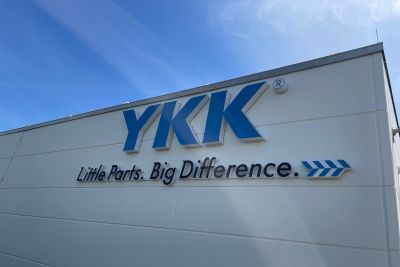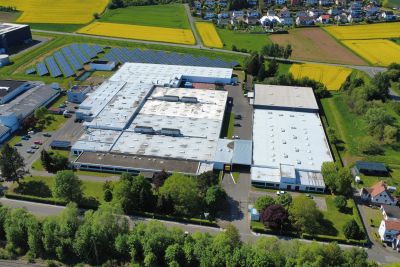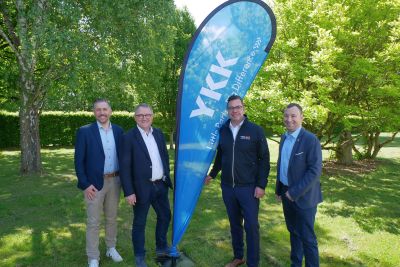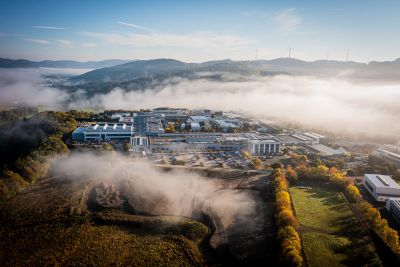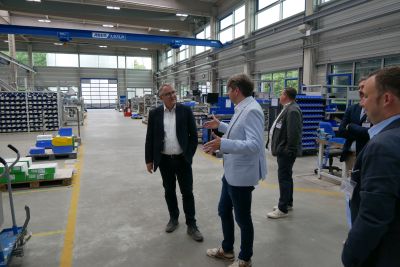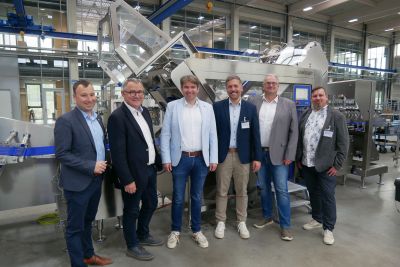On a tour of the Marburg-Biedenkopf district, HTAI’s CEO Dr. Rainer Waldschmidt and other representatives of Hessen’s economic development network visited three remarkable players in Central Hessen: YKK DEUTSCHLAND, the B236/B252 industrial and business park, and Weber Food Technology.
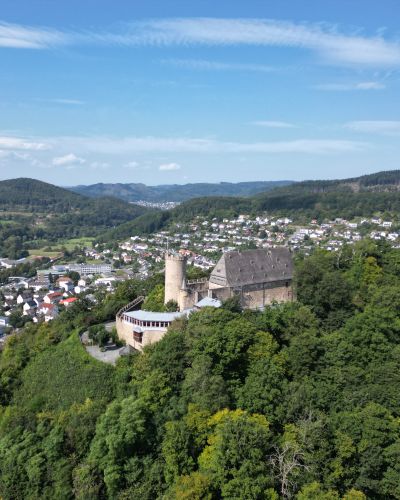
The Marburg-Biedenkopf district – home to global market leaders and hidden champions
On its recent tour through the multifaceted Marburg-Biedenkopf district, representatives of Hessen’s economic development network got to know three remarkable success stories from Central Hessen: a global market leader that was one of the first Japanese companies to set up operations in Germany, a future intermunicipal industrial and business park offering excellent development opportunities for international companies, and a highly specialized hidden champion that is currently investing millions in its longstanding home.
“The Marburg-Biedenkopf district, which is only an hour or so north of Frankfurt Airport, is a strong base for companies from a very wide range of sectors. Not only does it boast an optimal infrastructure, it also offers a highly trained workforce, a low cost of living, first-rate universities and an investor-friendly environment. Successful international companies have prized the region for decades and are continuously expanding their locations there – proof of the long-term advantages on offer. Close cooperation between the individual players in Hessen’s economic development network and direct local contacts allow us to provide dedicated support for everyone involved," says Dr. Rainer Waldschmidt, CEO of Hessen Trade & Invest GmbH (HTAI), the state’s economic development organization.
YKK: "Little Parts. Big Difference"
Together with Jonas Winkler, HTAI’s Director of Location Marketing & Investor Services, and Tobias Kurka, CEO of the Marburg-Biedenkopf economic development agency, the tour started by visiting YKK DEUTSCHLAND GmbH’s manufacturing facility in Weimar-Wenkbach (Lahn). The company’s headquarters are also located in Hessen, in Seligenstadt. Its parent, the Japanese YKK Group, employs over 45,000 employees in more than 70 countries and is one of the world's leading manufacturers and developers of fastening solutions. Founded in Tokyo in 1937, YKK came to Germany around 60 years ago as only the second Japanese firm ever to do so. Production started at its main plant in Wenkbach in Central Hessen, which also has its own research & development department, in 1972. Many of today’s staff have followed in their family’s footsteps and are now the second or third generation to be employed by the company, whose long-term presence and unique in-house training concept make it particularly special.
"Right down to today, our international expansion policy focuses on good public transportation links and the ability to be at an airport within an hour or so, since sustainability and environmental protection also play a key role here. Central Hessen offered us optimal opportunities from the start. Cooperation with the local players at our location in the Marburg-Biedenkopf region was always excellent as well, allowing us to continuously adapt the company to meet new developments and needs," explains Alexander Sann, YKK DEUTSCHLAND’s Deputy Factory Manager.
While YKK’s group parent has now diversified internationally into other areas such as cladding for high-rise buildings and window construction, the plant in Central Hessen focuses mainly on highly specialized zippers. Examples include flame-retardant and waterproof models for workwear, emergency services, or aerospace applications, plus leading-edge products for the luxury sector. The facility is also currently expanding its development and production of technical B2B applications, a move that also entails enhanced automation. "These products are used in suitcases, tents, or roller blind profiles, for example, as well as for cable ducts and pool covers. These applications often require extremely strong or highly specialized zippers, and our site here has global expertise in this area," Sann explains.
YKK DEUTSCHLAND has invested millions in future-proofing the Weimar-Wenkbach site in recent years, especially as regards its energy supplies and usage. The move is also intended to reduce its carbon footprint, since the company aims to be climate neutral by 2030 at the latest. In line with this, a solar park that will meet roughly 45% of the company's electricity needs was commissioned at the start of 2025 on an open space directly next to the plant. At present, work is underway with the help of LEA Hessen, the state’s energy agency, on a storage concept that will allow the company to make even more use of the solar power it produces in future.
Central Hessen offered us optimal opportunities from the start. Cooperation with the local players at our location in the Marburg-Biedenkopf region was always excellent as well, allowing us to continuously adapt the company to meet new developments and needs,"
B236/B252 Industrial Park: Intermunicipal - innovative - sustainable
Sustainability was also a key issue at the second stop on the tour by the development agencies’ tour, although the forward-looking project near Münchhausen also offers other strong arguments in favor of locating there. Ready-to-build commercial plots up to 6.5 hectares in size, the speed and flexibility of everyone involved, and broad-based support from the region’s politicians and society mean that B236/B252 – the intermunicipal industrial and business park that is being built on a roughly 17-hectare site near Münchhausen in the heart of Hessen – also offers large international companies ideal conditions. Initial infrastructure development began recently at the site, which is located at the intersection of federal highways 236 and 252. These have been partially extended and offer a direct link to the freeways to Frankfurt, Kassel, and Cologne. The planning was completed in record time thanks to the close cooperation between Münchhausen, Battenberg, and Burgwald, the three municipalities involved.
"We are taking a rapid, unbureaucratic approach to the project because we want to create something lasting in our wonderful region: an environment that helps companies grow and develop. Not only is the out-of-town location is suitable for manufacturing, but we are also setting high standards for sustainability," explains Holger Siemon, Mayor of Münchhausen.
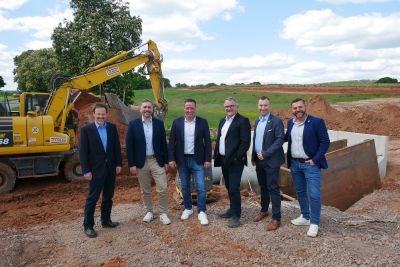
Minimum soil sealing, the planting of numerous trees to provide dedicated shade, photovoltaic systems on the buildings’ green roofs, and several wind farms in the vicinity all ensure that the new business park will be green and can help companies locating here meet their sustainability goals. What is more, the scenic surroundings are a draw for new employees, who also benefit from lower housing and living costs than in the state's urban centers. At the same time, the region offers a highly qualified specialist workforce and a strong industrial cluster with a long track record in the metal and plastics industry, for example. The Technische Hochschule Mittelhessen (THM) and the universities of Giessen and Marburg play an important role when it comes to education and training.
“All companies that locate to Central Hessen benefit from this exceptional infrastructure. HTAI, as the state of Hessen’s economic development organization, and the development agencies for the Marburg-Biedenkopf and Waldeck-Frankenberg districts are bringing together everyone involved to effectively market the new industrial and business park. Short distances and pragmatic partners make this project a particularly attractive way of quickly and flexibly establishing a presence in Hessen,” says Dr. Rainer Waldschmidt.
"We are taking a rapid, unbureaucratic approach to the project because we want to create something lasting in our wonderful region: an environment that helps companies grow and develop. Not only is the out-of-town location is suitable for manufacturing, but we are also setting high standards for sustainability,"
Weber Food Technology: Local Champion - Global Reach
The third stop on the tour was Weber Food Technology in Breidenbach. One of the world's leading suppliers of customized slicing and packaging lines for the food industry, the second-generation family firm is a true hidden champion, with 27 locations in 22 countries. Weber’s leading position depends on the exceptional expertise of its approximately 2,100 employees, with the company itself providing large-scale training and also working together with THM, for example, to ensure continuing professional development. This expertise pays off: With an in-house production rate of around 80 percent, the company does not need to rely on standard solutions for its machine components, but instead can redefine the production process as and when needed. The use of state-of-the-art processes such as 3D printing, VR technology, and digital twins goes without saying. Even the screws required are developed and manufactured by the company itself, complete with a special, proprietary seal for the food sector.
“Success on the global market depends more than anything else on speed and innovative strength. Our dedicated research and development work at our headquarters in Breidenbach allows us to achieve just that. That's why we have successively extended our operations here over the years and are currently investing a substantial double-digit million amount in continuing our expansion”
“Success on the global market depends more than anything else on speed and innovative strength. Our dedicated research and development work at our headquarters in Breidenbach allows us to achieve just that. That's why we have successively extended our operations here over the years and are currently investing a substantial double-digit million amount in continuing our expansion,” explains Tobias Weber, Weber Food Technology’s CEO and the son of the company’s founder. Going forward, this will increase the size of the Breidenbach site – currently around 25,000 square meters – by nearly another 15,000 square meters. Here, too, climate neutrality is a key consideration, with the company aiming to install not only photovoltaic systems but also its own wind turbines and innovative storage systems.
At the end of the day the entire region benefits from this innovative strength explains Tobias Kurka, CEO of the Marburg-Biedenkopf economic development agency: “Face-to-face communication and networking are essential for all companies and sectors. As a regional economic development agency, we can establish contacts and connect the right people with one another.”
HTAI, which works at state level, is responsible for international liaison. For example, Weber Food Technology has already taken part in a round table on the EU–Mercosur agreement that was organized by Hessen’s economic development agencies with a focus on Brazil – a key sales market for the engineering sector. The firm will also soon take part in a company mission to São Paulo, which is being organized by HTAI on behalf of the state.
“Making the right contacts and creating the right opportunities in this sort of way is our core business at Hessen’s economic development network. The three very different visits demonstrated how broadly positioned the Marburg-Biedenkopf region is. And the services we offer companies in all parts of Hessen are just as varied,” says HTAI CEO Dr. Rainer Waldschmidt at the end of the tour through the district.
“Making the right contacts and creating the right opportunities in this sort of way is our core business at Hessen’s economic development network. The three very different visits demonstrated how broadly positioned the Marburg-Biedenkopf region is. And the services we offer companies in all parts of Hessen are just as varied.”


